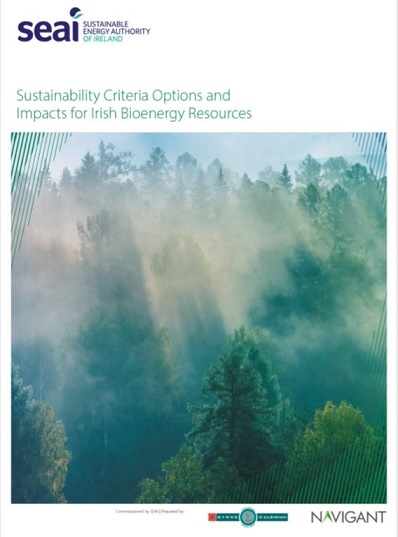Sustainability criteria options and impacts for Irish bioenergy resources
Biomass sources with low lifecycle emissions and sustainable land‐use management and governance, can reduce greenhouse gas emissions.
About the report
This report examines the sustainability of using biomass fuels to produce renewable energy in Ireland. The research found that Ireland is in a position to supply sustainable biomass to the energy sector, but only if suitable sources of biomass are used.
SEAI appointed Byrne Ó Cléirigh (BÓC) and Navigant to propose an appropriate approach to solid and gaseous bioenergy sustainability for Ireland that will support the goal of promoting sustainable low carbon bioenergy feedstocks. The study was carried out in three phases; this report covers the activities carried out in phases 1 and 2.
Phase 1: Looks at what constitutes sustainable biomass
Phase 2: Looks in more detail at likely biomass supply chains in the Irish context
Key messages
- Sustainable bioenergy has an important role to play in a low-carbon energy system, and will need to contribute about 20% of the world's energy in 2050
- To be sustainable, bioenergy must avoid negative impacts to land, food security, water resources, biodiversity and livelihoods
- Ireland is in a position to deliver sustainable bioenergy though a diverse set of supply chains and energy conversion technologies
- Options with low lifecycle emissions and sustainable land‐use management and governance can reduce greenhouse gas emissions
- Greenhouse gas emissions risks exist for wood pellets imported from the USA, wood pellets from short rotation coppice willow, and biogas from grass silage under current cultivation practices
- Biomass fuel that comes from Irish forest residues and from the by-products of the wood industry comply with the EU sustainability criteria. Wet animal manure benefits from a significant negative emissions credit under the EU rules
- Ireland and other EU countries need to decide on standards for support schemes and installations using solid and gaseous biomass and governance schemes, such as approve supplier lists or certification schemes
To be sustainable, bioenergy must reduce greenhouse gas emissions and there are actions that can improve the sustainability of bioenergy. For example, only those parts of a tree that are unsuitable for timber products should be used to generate energy. Using timber for building construction and to make everyday products, such as tables and doors, locks the carbon away for many crucial decades and is by far the best use of this valuable resource.The development of Irish sources of renewable energy, can create local jobs and encourage inward investment. Renewable energy is essential to support the transition to a sustainable economy - one that is not wedded to the use of imported fossil fuels.
